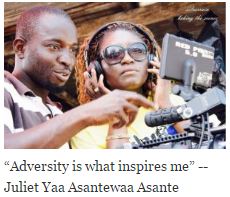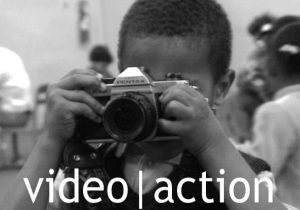by Brigitte Yuille
 Once you learn about Juliet Yaa Asantewaa Asante, you may call her the “Oprah Winfrey of West Africa.” However, Juliet’s story of success is not only unique; it could be a fascinating film of its own.
Once you learn about Juliet Yaa Asantewaa Asante, you may call her the “Oprah Winfrey of West Africa.” However, Juliet’s story of success is not only unique; it could be a fascinating film of its own.
Strengthening Her Resolve
During the 1980s, Liberia was transformed. A civil war erupted as a result of a violent political upheaval. The war lasted for more than a decade. Hundreds of thousands of people lost their lives, and those who survived were scared by the trauma they saw and heard. Their lives were forever altered.
Juliet Asante was an adolescent when she lived in Liberia. Fortunately, her upper middle class family fled to the peaceful country of Ghana. Juliet and her siblings were able to leave before the war broke out, but her parents, she says, were not so lucky.
The family social status changed as they tried to reestablish themselves in a new land. Juliet became saddened as she learned that many of her childhood friends did not survive the war. However, the challenges and the trauma of war wasn’t her only struggle. Juliet had become disabled. She couldn’t walk. Her mind would often wonder. She would vividly see herself running and walking with ease.
Her parents consistently attempted to make her daydreams a reality. They would venture to small towns and villages in search of adequate health facilities and treatments. None of the facilities offered a solution, so her family resorted to traditional methods; they sought out a medicine doctor. Ultimately, this alternative worked. They found a traditional doctor who used herbs and exercises that eventually enabled Juliet to walk. As Juliet looks back, she concludes that those experiences strengthened her “backbone.”
As a teenager, Juliet “lived in her mind,” and immersed herself in romance books. She became fascinated with the stories’ structures, and how the stories were told.
“At that time, I didn’t know that I was going to enter film, I just knew that I had a really active imagination. I just naturally moved towards film because that was such a powerful tool for the expression of my imagination.”
Reading also helped her master the English language.
When she discovered the film industry, she wanted to be in front of the camera. “I didn’t understand what went into making a film, so I was just attracted to all the characters I would see,” Juliet explains. “But as soon as I went into film, I realized that I would love watching the crew.”
She loved the idea of controlling what was seen in front of the camera. Juliet also realized that she wanted to have financial control. She looked at the lifestyles of some celebrities, and noticed how many of them spiraled downward.
“I thought, ‘I must control this process; I must make it into a business; I must survive this’,” she shares.
Juliet Asante: The Award-Winning Media Mogul
Today, Juliet Asante is an award-winning and renowned Ghanaian actress, talk show host, film and television producer and film director. The graduate of Harvard University’s J.F. Kennedy School of Government is the founder and C.E.O of the production and communications consulting firm called Eagle Production Limited. The firm has produced television shows, films and workshops that train actors. Juliet has also served as the editor of an entertainment magazine, Entertainment Today, and the president of the Ghana Chapter of Women in Film in Television International. This past fall she taught Mass Communications at at the Webster University campus in Ghana.
“I grab every opportunity I can to engage and share and teach, I see teaching as more of an exchange process:you learn from your students, they learn from you,” she explains.
Juliet’s philanthropic work includes the roles of founder and director for Save Our Women International, a nonprofit organization that teaches sex education to young women; and, organizing the Voice Off Africa Forum, which closes “the gap between media entrepreneurs and the investment community.” In August 2016, she held the first annual Black Star International Film Festival in Accra, Ghana.
Juliet is also a mother.
Her recent film SilveRain, a film she directed, received nominations in three categories for the 2015 Africa Movie Academy Awards including Best Film. The movie portrays a love story that consciously draws attention to the social class divide between the rich and the poor. It also advocates for young women working in the Ghanaian marketplace. It focuses on the “Kayayos,” which means “head porter.” They are often young girls that migrate from poor communities to better communities in attempt to make a living.
“Imagine yourself going to the supermarket, you don’t have a cart to put your stuff in, but you have a human being who carries a pan, or carries a cap on their head, or pushes it for you,” Juliet explains. “The unfortunate thing is that when they come to the cities, usually they don’t have family; they don’t know no one.” These girls, she says, end up living and working in the marketplace, which is often a dangerous environment.
“I believe in using film as a tool for advocating social change. SilveRain accomplished that and brought a lot of awareness and intervention to the Kayayei in Ghana,” Juliet says.
Juliet is a strong believer in the Pan-African movement. She describes the movement as a means to encourage Africans and people of African descent from all over the world to come together and connect more. Therefore, Juliet recruited and hired talent and crew from countries all over the continent, such as Nigeria, Kenya and Sierra Leone. SilveRain was filmed in Accra, Ghana and Johannesburg, South Africa.
Juliet’s latest accomplishments include a short mobile movie filmmaking venture called Mobilefliks.
She believes it could open new doors in distribution for filmmakers. “It took working with the network almost 5 years to get to the point where a full movie was released on the network, in chapters. It did very well and we are working to make this opportunity available to all filmmakers,” she explains.
Her first annual Black Star International Film Festival caused her to take a step back to say “wow.”
“Oh my God, it exceeded everyone’s projections,” she said. “We had four thousand submissions.”
The idea of the film festival came to Juliet as she tried to make SilveRain available and accessible to the public. The festival’s main focus is the business of film. She wanted to address topics that filmmakers often struggle with such as rights, financing and markets.
This year she’s adding more programs like a cultural immersion session, which introduces people to the cultures of different ethnic groups; a talent market; and, a film market that’s focused on youth. She also plans to increase networking and training opportunities.
Her goal for the film festival is for it to become one of the most important festivals on the continent of Africa.
Advice to Female Filmmakers
“Just go on and do it,” Juliet advises, “Just get a body of work.”
She stresses the need to get out of your comfort zone and be innovative. Come up with a simple story, and invest in sound and a good cinematographer.
Despite her limitations, Juliet made sure to read a lot of books, join film associations, and she contacted people by phone, mail and even visited them in person when she was unable to get a hold of them.
Juliet also suggests expanding your opportunities. Don’t let Hollywood be your only focus. Take advantage of the opportunities in other markets even if it means going international. She considers having access to several markets as a good thing because it allows you to gain valuable work experience and a body of work that leads you to your ideal destination.














